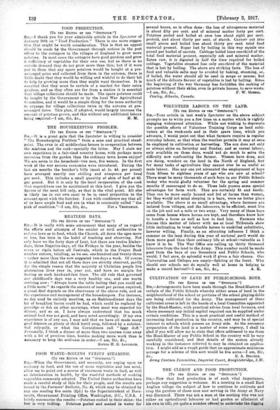THE CLERGY AND FOOD PRODUCTION.
[To THE EDITOR or THE " SPECTATOR."] SIR,—Now that food production is of such vital importance, perhaps any suggestion is welcome. At a meeting in a small East Anglian village the subject of how to continue to cultivate and crop the gardens of those men now serving in the Army or Navy was discussed, There was not a man at the meeting who was not either an agricultural labourer or had garden or allotment of his own to till; yet quite a number offered to undertake the digging of some woman's garden who could not get it done otherwise. Now, the clergy of the Church of England are not allowed to fight to defend their people and homes; yet could not each clergyman of a country parish undertake to do what these hard-working men nobly offered? They would thus prove themselves one with their people in aim and endeavour by doing their bit in this most im- portant matter. How their parishioners (both Nonconformists and Churchgoers) would respect them for doing such honourable toil! It seems such a chance to get into the people's lives and hearts by the practical " help which is worth a deal of pity," as well as being actively patriotic. No doubt some of the clergy would make very poor hands at the work at first, but surely what an uneducated person can do an educated person can learn, even if it takes him longer and greater effort. Quite old men who had given up farm work have begun again in the fields, and so are helping the farmers to keep up the food supply. Surely our country clergy have as much time and strength to give to a soldier's other- wise neglected garden as these old men who have gone into harness again at their country's need.—I am, Sir, &c.,
R. B. SPRINGFIELD.







































 Previous page
Previous page